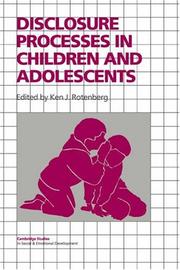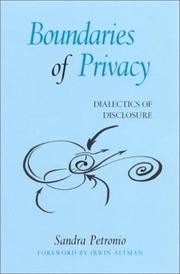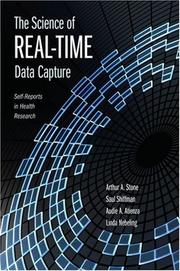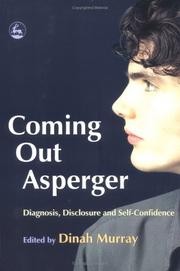| Listing 1 - 7 of 7 |
Sort by
|

ISBN: 0521470986 0521028604 0511527748 0511886233 Year: 1995 Publisher: Cambridge : Cambridge University Press,
Abstract | Keywords | Export | Availability | Bookmark
 Loading...
Loading...Choose an application
- Reference Manager
- EndNote
- RefWorks (Direct export to RefWorks)
To be known, and to know others, is critical to all social relationships. This topic of 'disclosure processes' not only pertains to people's disclosure of daily thoughts and emotions, but to their disclosure of many controversial problems in contemporary society, such as divorce, AIDS and sexual abuse. The bulk of research has focused on disclosure processes in adults and relatively little attention has been given to that phenomena in children and adolescents. The collection of chapters in this book redresses the balance by systematically examining disclosure processes in children and adolescents. This covers the knowledge of how, to whom, and the conditions under which children and adolescents reveal their personal thoughts and emotions.

ISBN: 0791487857 0585492468 9780585492469 9780791455159 0791455157 9780791487853 0791455165 9780791455166 Year: 2002 Publisher: Albany : State University of New York Press,
Abstract | Keywords | Export | Availability | Bookmark
 Loading...
Loading...Choose an application
- Reference Manager
- EndNote
- RefWorks (Direct export to RefWorks)
Offering a practical theory for why people make decisions about revealing and concealing private information, Boundaries of Privacy taps into everyday problems in our personal relationships, our health concerns, and our work to investigate the way we manage our private lives. Petronio argues that in addition to owning our own private information, we also take on the responsibility of guarding other people's private information when it is put into our trust. This can often lead to betrayal, errors in judgment, deception, gossip, and privacy dilemmas. Petronio's book serves as a guide to understanding why certain decisions about privacy succeed while others fail.
Interpersonal communication. --- Privacy. --- Secrecy. --- Self-disclosure. --- Communication --- Interpersonal relations --- Social psychology --- Secrecy --- Solitude --- Concealment --- Privacy --- Hiding places --- Disclosure of self --- Revelation of self --- Self-disclosing behavior --- Self-revelation --- Extraversion --- Interpersonal communication --- Self-disclosure
Book
ISBN: 1429417625 9781429417624 Year: 2000 Publisher: Carbondale, IL : Southern Illinois University Press,
Abstract | Keywords | Export | Availability | Bookmark
 Loading...
Loading...Choose an application
- Reference Manager
- EndNote
- RefWorks (Direct export to RefWorks)
"Based on an ethnographic study spanning four years, George H. Jensen's Storytelling in Alcoholics Anonymous: A Rhetorical Analysis calls upon Bakhtinian theory to analyze storytelling in AA." "Jensen covers Bakhtin's theory of the relationship between the author and the hero of a text, using Lillian Roth's autobiographies as counterexamples of AA talks. He discusses "rigorous honesty" within AA programs and provides a detailed analysis of the rhetorical act of stating "I am an alcoholic" in the context of an AA meeting. He devotes an entire chapter to explaining how AA meetings provide an example of what Bakhtin meant by carnival, a process through which humor, irony, and parody supply a mechanism for questioning commonly held beliefs. He shows how newcomers to AA move away from their egocentric personae as practicing alcoholics to adopt a new identity within AA. Turning back to Bakhtin, he describes the moments of discourse during which individuals confess past wrongs to God and to another person. Drawing further on Bakhtin, he examines the autobiographical moments of AA talks, stressing that these moments never become fully autobiographical. AA talks, Jensen argues, are fragmented yet achieve coherence through the interweaving of two important chronotopes. Finally, using Bakhtin's discussion of heroes in autobiography, Jensen discusses the kinds of heroes one typically finds in AA talks."--Jacket.
Alcoholics --- Communication in rehabilitation. --- Storytelling. --- Self-disclosure. --- Communication in rehabilitation --- Storytelling --- Self-disclosure --- Social Welfare & Social Work --- Social Sciences --- Substance Abuse --- Disclosure of self --- Revelation of self --- Self-disclosing behavior --- Self-revelation --- Extraversion --- Interpersonal communication --- Story-telling --- Telling of stories --- Oral interpretation --- Children's stories --- Folklore --- Oral interpretation of fiction --- Rehabilitation --- Alcoholism --- Rehabilitation. --- Performance --- Alcoholics Anonymous.

ISBN: 128115671X 9786611156718 0195346319 9780195346312 0195178718 9780195178715 6611156712 0197708552 0190292458 Year: 2007 Publisher: Oxford ; New York : Oxford University Press,
Abstract | Keywords | Export | Availability | Bookmark
 Loading...
Loading...Choose an application
- Reference Manager
- EndNote
- RefWorks (Direct export to RefWorks)
With contributions from top researchers, this text examines real-time data capture (RTDC) techniques in medical research. It discusses the concepts behind RTDC and how to implement it and analyse the resulting data.
Human experimentation in medicine --- Self-evaluation. --- Self-appraisal --- Self-estimate --- Self-rating --- Self-report --- Evaluation --- Self-perception --- Social comparison --- Self-evaluation --- Human experimentation in medicine - Congresses --- Data Collection --- Computer Systems. --- Research --- Self Disclosure. --- Technology. --- Time. --- methods.

ISBN: 0803926197 0803926189 9780803926196 Year: 1988 Volume: 7 Publisher: Newbury Park (Calif.): Sage,
Abstract | Keywords | Export | Availability | Bookmark
 Loading...
Loading...Choose an application
- Reference Manager
- EndNote
- RefWorks (Direct export to RefWorks)
Communication in marriage. --- Self-disclosure. --- 316.772.4 --- #SBIB:316.356.2H2500 --- Communicatie naar deelname, naar schaalgrootte--(communicatiesociologie) --- Gezinsorganisatie en besluitvorming --- 316.772.4 Communicatie naar deelname, naar schaalgrootte--(communicatiesociologie) --- Body language --- Communication in marriage --- Self-disclosure --- 316.356.2 --- 316.356.2 Gezinssociologie --- Gezinssociologie --- Disclosure of self --- Revelation of self --- Self-disclosing behavior --- Self-revelation --- Extraversion --- Interpersonal communication --- Marital communication --- Marriage --- Kinesics --- Nonverbal communication (Psychology) --- Nonverbal communication --- Primary groups --- Sociology of the family. Sociology of sexuality --- Body language. --- Klinische psychologie --- interactie en interventie.

ISBN: 184642450X 9781843102403 1843102404 9781846424502 9781846424502 1843102404 Year: 2006 Publisher: London ; Philadelphia : Jessica Kingsley Publishers,
Abstract | Keywords | Export | Availability | Bookmark
 Loading...
Loading...Choose an application
- Reference Manager
- EndNote
- RefWorks (Direct export to RefWorks)
This book explores the complexity of diagnosis for Asperger Syndrome, the drawbacks and benefits of disclosing a "hidden disability," and how this impinges on self-esteem. The contributors include some of the best-known and most exciting writers in the field of AS today, and include individuals on the autism spectrum, parents and professionals.
Asperger's syndrome --- Asperger's syndrome. --- Self-disclosure. --- Disclosure of self --- Revelation of self --- Self-disclosing behavior --- Self-revelation --- Extraversion --- Interpersonal communication --- AS (Psychiatry) --- Asperger syndrome --- Asperger's disorder --- Autistic psychopathy --- High-functioning autism --- Psychopathy, Autistic --- Autism spectrum disorders --- Syndromes --- Diagnosis. --- Patients
Book
ISBN: 022626808X 9780226268088 9780226267890 9780226267920 Year: 2015 Publisher: Chicago : University of Chicago Press,
Abstract | Keywords | Export | Availability | Bookmark
 Loading...
Loading...Choose an application
- Reference Manager
- EndNote
- RefWorks (Direct export to RefWorks)
We are living through a boom in autobiographical writing. Every half-famous celebrity, every politician, every sports hero-even the non-famous, nowadays, pour out pages and pages, Facebook post after Facebook post, about themselves. Literary theorists have noticed, as the genres of "creative nonfiction" and "life writing" have found their purchase in the academy. And of course psychologists have long been interested in self-disclosure. But where have the philosophers been? With this volume, Christopher Cowley brings them into the conversation. Cowley and his contributors show that while philosophers have seemed uninterested in autobiography, they have actually long been preoccupied with many of its conceptual elements, issues such as the nature of the self, the problems of interpretation and understanding, the paradoxes of self-deception, and the meaning and narrative structure of human life. But rarely have philosophers brought these together into an overarching question about what it means to tell one's life story or understand another's. Tackling these questions, the contributors explore the relationship between autobiography and literature; between story-telling, knowledge, and agency; and between the past and the present, along the way engaging such issues as autobiographical ethics and the duty of writing. The result bridges long-standing debates and illuminates fascinating new philosophical and literary issues.
Autobiography --- Autobiography in literature. --- Autobiographical fiction. --- Philosophers --- Philosophy. --- Authorship. --- autobiography, biography, celebrity, fame, authorship, creative nonfiction, life writing, self disclosure, interpretation, understanding, deception, delusion, narrative structure, literature, storytelling, knowledge, agency, memoir, memory, past, ethics, simone de beauvoir, fraud, truth, honesty, obscurity, exposure, stanley cavell, characters.
| Listing 1 - 7 of 7 |
Sort by
|

 Search
Search Feedback
Feedback About UniCat
About UniCat  Help
Help News
News